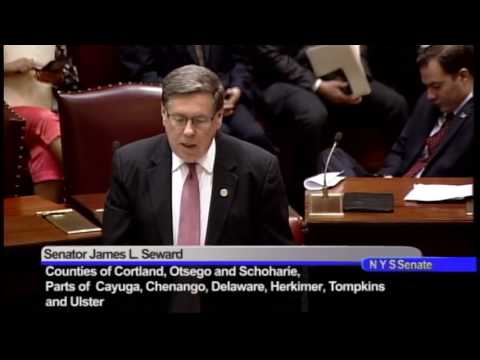
Seward Bill Included in Senate Regulatory Reform Package
Jeff Bishop, Communications Director
May 11, 2016

ALBANY, 05/11/16 -- State Senator James L. Seward (R/C/I – Oneonta) today announced senate passage of a comprehensive package of legislation to make it less expensive and more efficient to do business in New York. The package included a bill sponsored by Senator Seward (S.7104) which would reverse a costly regulatory change that is driving up health care expenses for some employers and employees.
“We hear all too often that New York State is unfriendly to businesses,” said Senator Seward. “To spur our economy and encourage job growth we need to eliminate unnecessary and outdated regulations that only burden companies that want to thrive here in the Empire State. This legislative package will help in several ways.”
Reducing Health Care Expenses
S.7104, sponsored by Senator Seward, helps businesses facing significantly higher health care costs as a result of state regulations that took effect earlier this year by redefining what constitutes a “small group employer”.
“The federal Affordable Care Act created various unintended consequences that both businesses and consumers continue to run up against. My legislation would help clear up one of those costly regulatory hurdles for mid-sized employers and help them continue to offer affordable health insurance benefits to their workers,” Seward added.
A small business has historically been defined in New York as an employer with 50 or fewer employees, but the federal Affordable Care Act (ACA) defined “small group” employers as those having 100 or fewer employees. Since New York took the required action to conform its definition of small business with the ACA’s larger number, businesses with 51-100 employees have experienced substantial increases in health care premiums or subscriber costs; higher deductibles and co-pays; fewer available policy choices from insurance carriers or health plans; and narrower in- and out-of-network provider panels.
This measure would prevent these problems from affecting these businesses by reverting the definition of “small group” in New York’s insurance law to 1-50 employees. While federal legislation has been enacted allowing states to make such a change in implementing the ACA, each state individually must do so. Only New York, California, Colorado, and Vermont have not yet adopted the change.
Requiring The State to Promptly Pay Businesses
The senate gave final legislative passage to S.6387B that would require state agencies to pay small businesses within 15 days of receipt of an invoice and would allow state agencies one year to implement these changes to their prompt payment system.
Reforming the Regulatory Process
S.401A would establish a Task Force for the Review of the State Administrative Procedure Act (SAPA) to help reduce the state’s regulatory burden on businesses. The task force would conduct a comprehensive review of SAPA by examining, evaluating, and making recommendations improving the efficiency of the rulemaking process, as well as ensuring the establishment of consistent, uniform rules.
S.406A helps regulate businesses by reducing duplicative rules and keeps them up-to-date. It would broaden considerations required during the state’s review of existing administrative rules and during the creation of new rules. This measure would also amend SAPA to require a five-year review of all existing agency rules – not just the rules promulgated since 1997, as in currently required. As part of the five-year review, this legislation requires an agency to provide additional information regarding the need for a rule.
S.4033 would provide a way for outside parties like businesses to seek a delay in the effective date of proposed agency rules if a flaw is discovered that could negatively impact them. As long as two-thirds of the Administrative Regulations Review Commission approves, a delay of 90 days would give parties a chance to discuss alternatives and correct matters.
S.4328A would establish the Small Business Negotiated Rule Making Act of 2016 to create negotiated rulemaking in order to provide additional opportunities for small businesses and the public to directly participate in the development of proposed agency regulations.
The bills have been sent to the assembly, except S.6387B, which has already received assembly approval and will be sent to the governor.
-30-
related legislation
Share this Article or Press Release
Newsroom
Go to NewsroomNew Herkimer Fire Truck Ready for Action
May 18, 2017

Senate Passes Mitchell's Law
May 16, 2017


